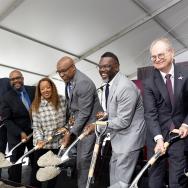Susan and Tandean Rustandy have donated $20 million to the University of Chicago Medicine to support the development of Illinois’ first and only freestanding facility dedicated to cancer care and research, scheduled to open in 2027.
The $815 million project to build the 575,000-square-foot cancer pavilion advances the University of Chicago’s and UChicago Medicine’s goals for cancer prevention, health equity and survivorship, and builds off its leadership in cancer research and treatment. UChicago Medicine has held National Cancer Institute (NCI) designation since 1974 and has been an NCI Comprehensive Cancer Center since 2008—the gold standard for cancer programs. It is one of only two organizations in Illinois with NCI’s “comprehensive” designation and one of 32 institutions in the country selected as Lead Academic Participation Sites for the NCI’s National Clinical Trials Network.
In making the gift, Tandean Rustandy, who serves as a trustee for both the University of Chicago and University of Chicago Medical Center boards, noted cancer’s profound impact on society. Cancer is the second leading cause of death in the U.S., and there were an estimated 2 million new cases diagnosed in 2022 alone. The Centers for Disease Control & Prevention predicts the country’s new cancer cases will increase by 49% between 2015 and 2050.
“These statistics are a stark reminder of the importance of advancing research and treatment options to make a tangible difference in the lives of patients and their families,” Rustandy said. “We all know someone who has been affected by cancer, and I am steadfast in my belief that we must work together to make a significant and positive impact for patients and the field of cancer research.”
The couple’s gift will support the efforts of UChicago Medicine’s nationally recognized clinicians, physician-scientists, and researchers to collaborate and find novel treatments, including new cellular therapies that work against more types of cancers and radiotheranostics, which attack cancer cells while leaving healthy cells intact. They also will work to dramatically improve cancer patients’ overall care experiences and reduce health disparities in underserved communities, including Chicago’s South Side, where cancer death rates are twice the national average.
“The new cancer pavilion will bring together more than 200 of my colleagues―all of us working across disciplines—to reduce the burden of cancer on patients and families, as well as the communities we serve,” said Kunle Odunsi, director of the UChicago Medicine Comprehensive Cancer Center. “We are building a cancer program of the future and are very grateful for Susan and Tandean Rustandy’s support and dedication to helping us prevent, diagnose, study, treat and, ultimately, save more lives.”
UChicago Medicine held a groundbreaking ceremony for the cancer pavilion in September 2023. The event featured performances by the Chicago Mass Choir and was attended by Chicago Mayor Brandon Johnson, Illinois Attorney General Kwame Raoul, and University and UChicago Medicine leaders and staff.
The University of Chicago has long been fertile ground for cross collaboration. UChicago Medicine oncologists and hematologists work closely with basic and translational scientists, microbiome specialists, molecular engineers, chemists, physicists, data scientists, economists, public policy researchers, psychologists and social workers, among other University colleagues. The cancer pavilion will serve as the focal point for emerging areas of research, such as cancer metabolomics, and leverage the latest approaches in big data and artificial intelligence to better diagnose and personalize cancer treatment.
“The new cancer pavilion represents the future of oncology,” said Mark Anderson, executive vice president for medical affairs and dean of the Biological Sciences Division at the University of Chicago. “Philanthropic partners like the Rustandys bring this future closer for the physicians and scientists in their pursuit to find cures for cancer and for the countless number of people across the globe who will benefit from their achievements.”
Rustandy is the CEO and founder of PT Arwana Citramulia Tbk, a publicly traded, Indonesia-based manufacturer of ceramic floor and wall tiles. He received his master’s in business administration from the University of Chicago Booth School of Business in 2007.
“Susan and I are honored to contribute to the University of Chicago’s mission and initiatives to pursue globally impactful solutions to seemingly unsolvable challenges,” Rustandy said. “We believe in the power of collaborative efforts to effect transformative change, and the new cancer pavilion holds immense potential to impact not only the local community, but also the broader landscape of patient care globally.”
The Rustandys have been generous benefactors to the University of Chicago, including providing philanthropic support for the College, the Divinity School and Chicago Booth, where the Rustandy Center for Social Sector Innovation was established in 2013 as a permanent hub for social impact. In 2014, the couple established the Tandean Rustandy Fund for Fundamental Cancer Research in the University’s Biological Sciences Division.
—A version of this story was originally published on the University of Chicago Medicine website.

